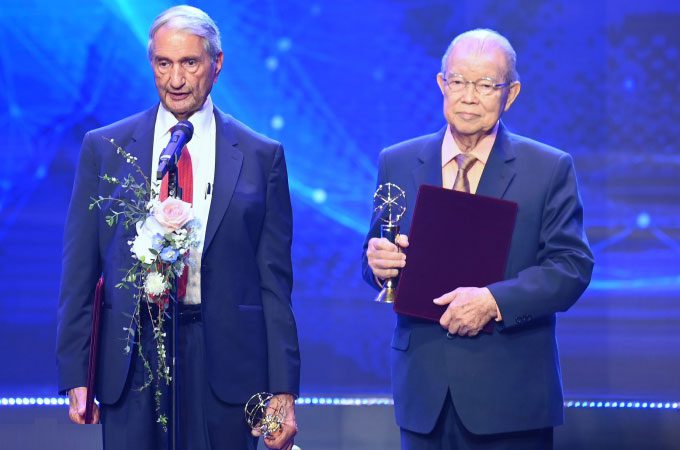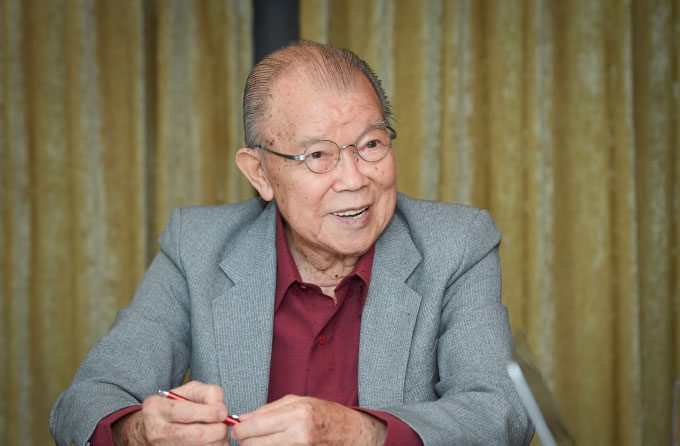Receiving 5 grams of IR36 rice seeds sent via postal service from Professor Gurdev Singh Khush, Professor Võ Tòng Xuân is researching ways to defeat the “brown planthopper” that devastates crops.
During a recognition ceremony on December 20 in Hanoi, People’s Teacher, Professor Dr. Võ Tòng Xuân (83 years old) was moved when the VinFuture Global Science and Technology Award Council announced his name in the special category for scientists from developing countries. He is the first Vietnamese scientist to receive the VinFuture Award. Along with Professor Gurdev Singh Khush (an Indian-American), the two scientists share the award worth $500,000, honoring their significant contributions to the invention and dissemination of many high-yield, disease-resistant rice varieties that help strengthen global food security.
In the agricultural revolution, Professor Xuân played a crucial role in popularizing the IR36 variety in areas frequently attacked by pests in the Mekong Delta and collaborated with farmers to apply advanced transplanting techniques. Thanks to these initiatives, he expanded the quality rice varieties and increased rice production at lower costs without using harmful chemicals.
He emphasized that supporting the application of new rice varieties has helped diversify agricultural production activities in the Mekong Delta. “These efforts have improved rice productivity and enhanced the livelihoods of farmers. As a result, they contribute to Vietnam’s rise as one of the top three rice-exporting countries in the world,” he stated on stage while receiving the award.

Professor Dr. Võ Tòng Xuân (right) and Professor Gurdev Singh Khush receiving the award. (Photo: Giang Huy)
It was in 1976, a year after obtaining his “doctor of agricultural science” degree in Japan (equivalent to a PhD), that he returned to Vietnam with the desire to train a team of agricultural engineers at Can Tho University. At that time, farmers in the Mekong Delta were suffering as most high-yield rice varieties IR26 and IR30 were devastated by brown planthoppers. “I, along with Associate Professor Nguyễn Văn Huỳnh, went to Tân Châu, An Giang to identify which varieties were being completely consumed. It was a new type of brown planthopper,” he recalled.
In this urgent situation, Professor Xuân contacted the International Rice Research Institute (IRRI) in the Philippines for assistance. Two weeks later, he received four envelopes sent via postal service from Dr. Gurdev Singh Khush, known as the “wizard of rice.” Each envelope contained 5 grams of seeds, including IR32, IR24, IR36, and IR38. Professor Xuân cultivated the four new pest-resistant rice varieties and selected IR36 as the best. To save the farmers, the only way was to find a method to quickly propagate the seeds.
He immediately began experimenting, and after a short time, he discovered a method for transplanting single seedlings to preserve the variety and increase yield. Professor Xuân convinced the administration of Can Tho University to close the entire campus for two months and send students to help local farmers combat the “brown planthopper.” Initially, many were hesitant because the traditional farming method involved transplanting 2-4 seedlings. However, when they learned that Professor Võ Tòng Xuân was behind it, they felt reassured to follow his lead. He, along with colleagues, taught farmers three fundamental principles: to prepare quality seedlings, plow the land thoroughly, and to transplant single seedlings. Ultimately, not only did they halt the brown planthopper invasion, but after the second crop, they harvested over 2 tons of rice.
By the 1980s, the IR36 rice variety was being used globally, with a cultivated area of up to 11 million hectares. By 2000, the widespread dissemination of IR36 and other rice varieties significantly contributed to increasing rice productivity, with output rising to 600 million tons. In addition to IR36, IR64 was widely planted over 10 million hectares within two decades of its release, positively impacting the lives of millions worldwide. By 2018, IR64 and its “descendants” were widely cultivated in many countries, becoming the most popular rice variety in tropical Asia, demonstrating their superiority and exceptional adaptability.

People’s Teacher, Professor Dr. Võ Tòng Xuân. (Photo: Văn Lưu).
In a conversation with the press on December 17, he stated that he still wants to farm alongside local communities, introducing new varieties to cover high-yield rice areas. Reflecting on his childhood, Professor Xuân recounted witnessing the immense hardships his uncles and aunts faced during harvest seasons, which motivated him to study diligently. In 1961, the young man received a scholarship to study at the University of Agriculture in the Philippines, graduating in Agricultural Chemistry with research in the sugarcane field.
In 1969, when the International Rice Research Institute (IRRI) was established, he applied to study rice, hoping to contribute to farmers. Initially, IRRI only allowed him to attend training as an auditor due to the lack of an official recommendation from the government. After daring to suggest changes to a lecturer’s “curriculum,” he caught the attention of the IRRI Director, who informed him that he would be hired. At the institute, he was a pioneer in promoting agricultural extension models in the Philippines, training techniques for high-yield rice cultivation.
After ten years in the Philippines, in 1971, he returned to Vietnam at the invitation of Can Tho University, hoping to rapidly disseminate knowledge and assist the people in rice farming effectively. After more than half a century dedicated to rice cultivation, the professor from An Giang tirelessly pursues experimentation and the development of disease-resistant crop varieties. He also actively sought out varieties being developed by the International Rice Institute for development. Along with his colleagues, he researched and attempted to breed delicious varieties, proposing initiatives to improve livelihoods, enabling farmers to export rice and earn income.
Among the thousands of students he has imparted knowledge to is engineer Hồ Quang Cua – the creator of the ST25 variety, which has gained international acclaim.
Professor Xuân acknowledges that although he has designed a plan for rice to “coexist with climate change,” this is not yet robust because farmers still operate on a small scale, and traders are still fragmented and opportunistic. He evaluates that the most important direction is to transform farmers into modern farmers, moving towards large-scale production, minimizing chemical fertilizers, and promoting organic and microbial methods to ensure rice develops well, is pest-resistant, avoids pesticide residues, and can trace its origin. Additionally, it is essential to connect farmers with businesses.
On the day of receiving the award, holding the trophy in his hands, Professor Võ Tòng Xuân was emotional. He represented his late wife, colleagues, students at Can Tho University, and millions of farmers in the Mekong Delta, expressing gratitude to the award council.
Professor Võ Tòng Xuân is a leading agricultural scientist in Vietnam. He is likened to the “father” of many delicious rice varieties in the Mekong Delta. In addition, he is an agricultural expert in Vietnam, specializing in food security issues for countries in the region. The revolution in agriculture has been significantly propelled by Professor Võ Tòng Xuân’s efforts in inventing and disseminating disease-resistant rice varieties, contributing to global food security. He plays a vital role in popularizing the IR36 variety across regions frequently attacked by pests in the Mekong Delta while collaborating with farmers to apply advanced transplanting techniques. Thanks to these initiatives, Professor Xuân has contributed to expanding access to quality rice seeds, enhancing rice production at lower costs without using harmful chemicals. He was appointed a professor of agriculture (1980), a Labor Hero (1985), and was a representative in the National Assembly for three consecutive terms (II, III, IV). Currently, Professor Võ Tòng Xuân is an honorary rector of Nam Can Tho University. |


















































